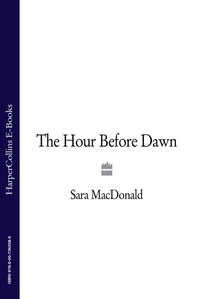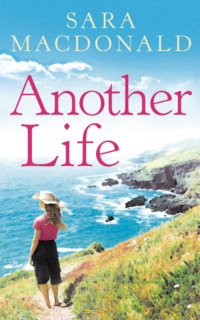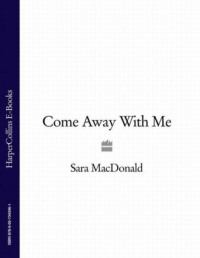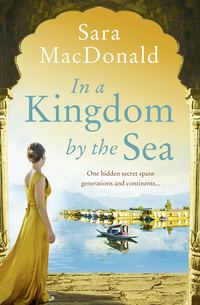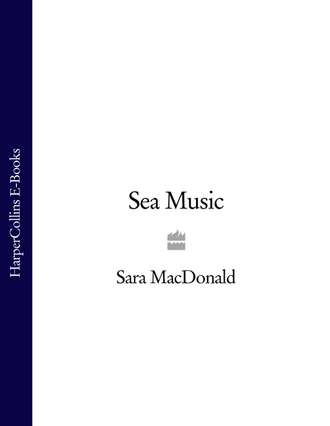
Полная версия
Sea Music
She bends to Martha. ‘What is it?’ she asks. ‘What’s the matter, Martha? Look, I’ve brought you a cup of coffee.’
Martha opens her eyes at the sound of her name. She is going to say, ‘I am Mrs Tremain to you,’ but when she sees the pretty girl whose anxious face is close to hers she is so pleased she smiles. ‘Hanna! Where have you sprung from? I haven’t seen you for ages!’
The girl places the cup of coffee in Martha’s hands. ‘My name is Kate. Is Hanna your daughter?’
Martha looks puzzled. ‘No, no, I don’t think so.’
‘I’m from the agency. I’m here to help look after you.’
‘You’re very pretty.’
The girl laughs. ‘So are you.’
Martha’s face lights up. ‘I used to be, darling.’
In that small face suddenly alight, in the ease of that casual endearment, Kate is captivated. Fred lowers the Daily Telegraph he is not reading and smiles at her.
‘Hello, Kate. Welcome.’
‘Thank you, Dr Tremain. I’ll just go and get your coffee.’
She comes back and perches on a chair next to him. ‘The vicar suggested you might like a drive this afternoon. There is a little gallery at Newlyn? He said you both enjoy going there, and then walking or driving along the front past the harbour.’
Fred looks up at her. ‘That sounds absolutely wonderful. Martha would love it. How kind. Mrs Biddulph doesn’t drive, you know.’
Kate smiles. ‘So I understand. Are you both OK here, if I go and do a bit of tidying up?’
‘Of course. Of course. We are both fine. Enjoying the sun.’
Kate makes their beds and tidies the bathroom. She is intrigued by this strange house with its shabby sofas and beautiful furniture, by its fading elegance and enormous conservatory that throws sunlight everywhere. The whole house smells dusty, rather like a greenhouse, and there is this sense of waiting. Is it waiting, this stillness? Or is it a vague sense of sadness, of lives coming to an end? Kate is not sure.
The Loving Care Agency jumped at the chance of taking her on even though she assured them she would only be temporary, that she intended to move on. The pay is appalling, but Kate is used to working for peanuts. The only help she has accepted, from the aunt she was working for in London, is the cost of a few weeks in an hotel while she looks for somewhere to live for the summer.
Kate goes to check on the two old people. Dr Tremain is sitting beside Martha and has taken her hand. They both sit looking out through the French windows to the garden. ‘“It was a perfect day /For sowing: just/ As sweet and dry was the ground / As tobacco-dust. / I tasted deep the hour/ Between the far/ Owl’s chuckling first soft cry” …’ Dr Tremain is reading aloud to Martha. Kate smiles. How wonderful.
She starts to prepare their lunch with the food Barnaby has put out for her. It is incredibly quiet here after London. She has a moment’s dislocation, as if she has suddenly jumped lives and found herself in someone else’s kitchen.
Edward Thomas? Of course it is! She studied him for A level. ‘And now, hark at the rain,/ Windless and light/ Half a kiss, half a tear,/ Saying good-night.’
Martha, suddenly restless, comes in and out of the kitchen asking the same question. ‘What are we having for lunch today?’
‘Chicken and chips?’
‘How lovely!’
Martha wanders off, circles the house again and comes in through the conservatory door.
‘Hello. Who are you?’
‘I’m Kate. I’m just getting your lunch ready.’
‘Lovely, darling, what are we having?’
‘Chicken and chips. Is that OK?’
‘My favourite.’
‘Good. It won’t be long. Shall I come and put the lunch-time news on for you?’
‘Thank you,’ Martha says vaguely.
Kate finds Fred has already turned the television on.
‘Come and sit down, darling,’ he says to Martha, ‘and watch the news with me.’
‘I will in a moment,’ Martha says, ‘but I am worried about lunch. What –’
‘Chicken and chips,’ Kate says firmly, pushing Martha gently down next to her husband. ‘I will be back in a moment.’
She is beginning to wonder how the vicar has not taken to drink. It is taking her ages to get this meal ready and she feels dizzy with repeating the same thing over and over again. She puts both their lunches on trays and carries them into the sitting room.
The room is empty. The television is talking to an empty room. Kate cannot believe it. Fighting panic she rushes back to the kitchen and dumps the trays and runs round the empty house shouting for them. How on earth could they both disappear so quickly and quietly?
She bolts out of the front door and down the drive, shaking with anxiety. Why did this have to happen on her first day?
Barnaby comes from the church with a parent on each arm. He smiles at her as he crosses the road with them. ‘Lost anyone?’ he jokes.
Kate, mortified, nearly in tears with fright, turns and rushes back into the house.
Barnaby settles his parents in front of the television with their trays of food and a sherry each and waits for the new carer to come out of the bathroom. He makes them both a cup of coffee while he waits.
When Kate returns to the kitchen, embarrassed, he says gently, ‘It’s quite all right, you know. I was only joking. You can’t have eyes in the back of your head and I don’t want my parents imprisoned in their own home.’ He pauses, facing the facts. ‘It’s becoming obvious that I’ll have to have two people here soon; it’s going to be too much for one person. I’m truly sorry you got a fright, Kate. I really am well aware how tiring looking after my parents is.’ He grins at her. ‘One dotty person is bad enough, two is a nightmare! It will be no discredit to you if you decide it’s just too much.’
‘No way!’ Kate says quickly. ‘I just completely misjudged the speed of your parents. I’m not going to give up after one day!’
Barnaby hands her a mug of coffee. ‘I’m glad. Go and have your lunch in the garden. Relax. It is like summer out there this morning. I’ll sit with my parents for an hour. I like to do that if I have time.’
Kate digs out a book and a sandwich from her bag and goes and sits against the trunk of the cherry tree under a great, sweeping arch of buds about to burst into blossom. She wonders what a good-looking, youngish vicar – young by priestly standards anyway – is doing unmarried and looking after senile parents on his own.
Barnaby tucks Martha into bed for her afternoon nap. Fred has gone back to his chair in the conservatory to try to do the crossword. Barnaby is puzzled by Fred. He wonders if his father has simply withdrawn from a life where his beloved Martha is now dotty. Sometimes Fred seems quite dotty himself; at other times Barnaby has the sensation he is merely hiding behind a supposed dottiness in order to avoid facing what is happening, as if a dark cloud of depression or loss has stunned him into a senility he does not really have.
Barnaby says goodbye to a more cheerful Kate and drives off to a parish council meeting in the village hall. Normally he dreads these competitive parochial monthly meetings, but today everyone seems united in their desire to raise funds to help the refugees in Kosovo.
Martha lies propped up on pillows watching the movement of wind through buds of pink cherry blossom. The tree is getting old and gnarled. The branches bend and creak, spread and arch. Soon fat fingers of blossom will trail almost to the ground in great sprays of pink hands that layer the lawn like confetti.
It reminds Martha of something. Of somewhere else. The feeling she cannot capture squeezes her stomach, as if her body has recovered a memory her mind refuses to recall. She closes her eyes, tries to banish this disturbing sensation and is taken suddenly back to another garden, where the flowers are gone, and all is now laid with vegetables.
She sees Papa bend to pick a caterpillar off a cabbage, his face grave as he turns to Mama, standing in the doorway of their house.
‘Esther? It is time we talked about sending Marta to England. I don’t know how long we have.’
‘Paul, no! Please, let’s wait … Don’t be pessimistic. We have so many good friends here, you are respected by everyone. The patients and the staff love you. We have standing here, my dear, and financial means, if things get difficult.’
Papa stares at Mama and shakes his head. ‘Esther’, he says quietly, ‘I beg you not to bury your head. Things are not just difficult, they are dangerous. What is the good of money if we cannot keep Marta safe? Please, you must accept what is happening. Everyone is fearing the worst. Both Germans and Poles are jumpy and frightened. Everyone is looking out for themselves. You must not count on anyone except fellow Jews. You will see, our Polish neighbours and German colleagues will not want to know us if Poland is invaded.’
They stare at each other over the space that was once a garden full of flowers and now contains only things they can eat. Marta knows her father is frustrated by her mother, who has never in her life faced hardship or loss, and cannot yet grasp what is happening. Cannot, or is reluctant to face the end of their way of life.
‘Heinrich will see we are all right. Heinrich won’t let anything happen to us. I know it. You are colleagues, Paul. You are friends. Our children have played together nearly all their lives.’
Papa walks abruptly towards the house. He does not see Marta sitting up in the window, listening. ‘Esther!’ he says angrily. ‘We are Jews. His wife comes from one of the old Imperial families. Do you really think that Heinrich can protect us from anything? What is the matter with you? Are your eyes shut? How can you fail to notice what is going on around you? Do you think our money can project us against this rising tide of anti-Semitism? Do you?’
Marta’s mother grows pale at her husband’s anger. He is a gentle man who does not raise his voice. Esther is not used to people being unkind to her. She was a spoilt child and went straight on to being a sheltered and beautiful child-wife. ‘Our children have known each other, played together … all their lives,’ she repeats.
‘That time is over. It is gone. They are children no more,’ Papa says firmly. ‘I don’t want that boy, who has the makings of a dangerous little Nazi, anywhere near Marta.’
His voice is sad: ‘Heinrich and I have known each other for longer than I care to remember. But whatever he privately feels about what is happening, they are Germans, Esther, and we are on the brink of war. Already the family are distancing themselves. At work I am being relieved of many of my patients, many of my duties. If the Germans invade Poland, I Would be relieved of all of them. You must understand, Esther, I could lose my clinic, my life’s work and probably all my money.’
‘You can’t know that!’ Mama’s voice is full of panic. ‘England will stop the Germans, you’ll see, Paul.’ She claps her hand to her mouth.
Papa says quietly, ‘I Wish with all my heart I could protect you and Marta from what is coming, but I can’t. I cannot leave. I am a doctor and will be needed. The only thing I can do is send you both to England.’
Mama stares at him, suddenly very sure. ‘No, Paul, We stay together as a family. Whatever happens, We stay together.’
Marta, sitting up in the window of her room, shivers. She looks down on her arms, which are covered in goose bumps as if a cold wind has suddenly sprung up. She runs down the stairs, past her mother and across the garden to her father and clutches his arms. ‘Don’t send me away,’ she cries. ‘You’re frightening me, Papa.’
Her father holds her hands between his for a moment and apologises for frightening her. He tries to change the subject, Make her laugh. He calls Pepe, their dog, and as they set off for their evening walk together he tells Marta about England and his friends who live there.
‘England is a very beautiful place, full of rivers and trees. In the towns there are parks to sit in the sun. People take their children and picnic and sail small boats in lakes. People mix freely, Matusia …’ Marta’s papa takes her arm. ‘A distant cousin of mine has offered to take you in. This is a great opportunity for you to learn, to extend your education. You are so good at languages … My dear child, I need to persuade your mama to let you go even if she will not leave me. You must trust me and help me to convince her that it really is the best thing to do.’
Marta is silent, for she knows Mama is right: they must all stay together. The birds of evening are singing and fluttering, caught in the blossom of the huge apple tree at the bottom of the next-door garden, where she plays with the boy. Marta listens to the noise the birds are making and her fear is back. She shivers again, her father draws her away and they circle the wood and go home for supper.
Marta remembers that walk. It was the last walk she ever took with her father without fear, without the hated yellow armband with the star.
Coming into Martha’s bedroom, Kate sees that despite the warmth of the room, Martha is shivering with cold, sitting upright in bed, her tiny limbs trembling. She looks in the cupboard and finds a pale blue mohair sweater, which she wraps round Martha. Then she helps her into her trousers, which she has taken off. Her legs are like sticks and slightly misshapen. Odd little legs.
Kate chats to Martha while she does these things, but Martha is a long, long way away and Kate knows in Martha’s head there is a different scene playing.
Twenty minutes later Kate has both the old people safely in the back of her car. She drives out of the gates and takes the road towards Newlyn.
As they drive along Kate thinks about how she will cope once she parks the car. She must hang on to both of them without seeming like a sheepdog. She is not going to lose them twice.
She turns the radio on low and twiddles the knob to Classic FM. Fred turns contentedly towards the sea as they reach the coast road. Frothy waves are bouncing off the sea wall and the sun glints on the surface of the sea in dancing sparks.
Martha does not see the sea. She is still somewhere far in the past. She is worrying about her knitting needle. Has someone stolen it? Her knitting needle is vital. Before she goes to bed she wants to poke it into the holes. She wants to poke out those revolting bugs that stop her sleeping.
‘My knitting needle,’ she murmurs.
Kate looks at her through the car mirror. ‘Don’t worry, Martha,’ she says comfortingly. ‘We’ll find it when we get you home.’
Fred folds her tiny hand in his large one and Martha is soothed. She looks out and sees the shimmering blueness of the sea and the bright fishing boats heading in and out of Newlyn, and is enchanted.
As they drive past the harbour with the heavy trawlers and sleek yachts crammed together, the wind catching their stanchions and making a wonderful clinking sound, Martha smiles happily.
‘How beautiful,’ she says to Fred, turning to him. ‘How beautiful, darling.’
Fred, seeing her lovely smile, smiles too, his heart aching with love and fear. All his life he has protected her, now the knowledge that he can no longer do so is slowly killing him. He brings her hand to his mouth.
‘My beloved little Martha,’ he whispers.
Kate turns the car round at the end of the road and drives back to park near the gallery. Watching their faces, she realises they don’t get out enough. She will try and change that.
‘What did you say?’ she asks Dr Tremain.
‘I said, it’s a long time since I was last here,’ Fred says clearly.
Kate smiles.
Chapter 9
Anna sits with her chair swivelled round from her desk, facing the long window of her study. She loves these early mornings. The stillness helps her think. She feels mellow and calm, as if she has not yet put up a barrier between herself and the coming day.
Wisps of pink cloud hang in a vivid blue sky. Anna is reminded of Cornwall where the day unfolds from a blackness over the ocean to slow-unfurling ribbons of colour reflected in the water. Even before dawn there was light behind the darkness, waiting.
She had forgotten, almost forgotten those Cornish mornings.
She closes her mind and breathes in the sky outside the window. Tries to remember the child she was with no demands or responsibilities, waking to a summer morning, running down to the water in near darkness. The acute shiver of loneliness and wonder in the sound and size of a huge sea rolling in to empty sands stretching all around her.
Lucy was the same as a child. Half the fun was getting outside with no one hearing you … She used to take Puck, the small Labrador cross Martha adored. Or was that later? Was she older when they got the dog?
Deep pink slashes of cloud are dispersing over the Thames, spreading across the city, blurring and smudging into the sky, like spilt water paints, tingeing the river and touching the buildings. She hears Martha’s voice: ‘Red sky in the morning, shepherd’s warning, darlink.’
How old was she before Martha said ‘darling’ properly? Anna cannot remember that either. She always has trouble remembering the sequence of her childhood. She often thinks her bad memory is the result of being so bored most of her childhood. Nothing of note ever happened to pierce the monotony of those seemingly endless years.
She gets up, goes to the long window and looks out into the wide, tree-lined road, at the elegant Edwardian houses opposite. It is deserted except for the line of parked cars. Curtains drawn. People sleeping.
She must be getting old, she concludes, if a sly trick of memory can turn those endless Cornish summers into nostalgia. Yet for a moment she does not see the houses; she hears the bent palm in Martha’s garden, hanging skewwhiff to the wind, rattling like dry fingers. She sees the glint of silver water and white houses illuminated on the other side of the harbour. She can hear the scream of gulls wheeling and circling above her head and the sensation of cold wet sand clinging to her feet. She sees Fred waving to her from the steps to the beach. She smells baking, and Martha, standing in that old-fashioned kitchen, pulls a chair out so she can lick the bowl.
Something rises up in her throat for what might have been. If she had been different. If they had. It is like fingering a bruise. She is sure her nightmares go back to her early years. She often thinks it must be because Martha was so often ill when she was small. When Martha took to her bed, or could not eat, it must have been an emotional illness, not a physical one. Anna does remember spending a lot of time with Hattie. Fear and sadness affect children. When she was little something about Martha frightened her. Easy to be frightened when you do not understand.
Only one thing sticks in her mind. She was furious with her mother and threw herself at her, clutching at her legs in a rage that consumed her. That is all she can remember: not wanting to let go of those legs. She cannot remember a face or arms or a voice. Just those legs trying to get away from her.
Anna pushes the image away, stretches and takes a deep breath. She can hear Rudi moving about upstairs and she goes back to her desk. For heaven’s sake, she is supposed to be studying her brief. Berlin was a success, but exhausting. Now she is about to reconvene a complicated criminal injury case and she is tired. Her workload is frightening this year.
She goes into the kitchen and grinds coffee and puts the pot on the stove. Places her files and papers back into her briefcase. She will have coffee with Rudi, then grab a sandwich later.
Rudi comes in smelling of soap, and kisses her. ‘You seem to get up earlier and earlier. Two complicated cases at the same time. Are you worrying, darling?’
Anna smiles at him. ‘No, not really. I’ve got a good team. But so have they. I do need to be on the ball …’ She reaches out and touches his arm. ‘Sorry if I bored you last night. I just wanted to run it past you.’
‘You never bore me. And I do know a bit about insurance companies.’
‘Well, I am still sure they, or the airline, are stalling, playing for time, and I am not sure why. My client will certainly never walk again. They cannot avoid liability. I expected the usual initial derisory offer of compensation, which would be unacceptable. Instead of which they asked for four days’ grace to make inquiries about a matter “vital to the outcome of the case”.’
‘Which means?’
‘Which means, either they have discovered something which makes the airline culpable and they will pull out, or something that I have not been told that makes my client responsible, or partly responsible, for his injuries.’ Anna puts down her half-finished coffee. ‘Anyway, this morning I will find out. I must go.’ She gets up and kisses him. ‘Why are you smiling?’
‘At the glint in your eye. God help the opposition.’
Anna laughs. ‘I shouldn’t be too late home tonight.’
‘In that case,’ Rudi says, ‘I shall cook you something delicious and healthy.’
Anna holds his face to her for a moment. ‘Wonderful.’
By the time she leaves the house the pink sky has disappeared and grey clouds cover the whole of the sky. As Anna walks to the tube station she remembers a task she was set at school: What is your very first memory? On the blackboard the teacher wrote, ‘My very first memory is …’
Anna sat and sat in front of a blank sheet of paper. She was quite unable to pick up her pen. Eventually her teacher said, ‘Anna, come on, this is not like you. What’s the matter?’
Anna had gone white and begun to shake. She was not going to write. She was not going to. She could not think … beyond … before … behind … For the first time in her life she fainted. Fred came to collect her, took her straight home. For some reason he was cross with her teacher. ‘For heaven’s sake, Anna is only nine years old. I know she is bright, but I don’t want my daughter pressurised.’
‘It was not Mrs Poole’s fault,’ Anna said to him in the car. ‘Dad, I can’t remember anything before my nightmares. I didn’t want to write about my nightmares.’
Fred turned to look at her and for a terrible moment Anna thought he was going to cry. He tucked her up on the sofa and lit a fire in the afternoon. Martha, pregnant with Barnaby, sat with Anna by the fire, playing snakes and ladders, and then they baked scones together. That day I did not spoil … I must have been ill, Anna thinks wryly.
What was it I was afraid of remembering?
She flashes her season ticket, goes through the barrier and stands on the platform waiting for the tube. This is the worst bit. She has finally trained herself, with Rudi’s help, to use the underground. But she hates the gathering moment before the train whooshes in and people prepare to rush and push. She can cope this early in the day, but she would not dream of travelling during the rush hour.
I suppose, she thinks, my childhood must have been happy. It must have been later, as I grew up and recognised the smallness, the limitations of their lives, that I grew bored and contemptuous. Maybe I was afraid I would grow up like them.
The train comes hurtling into the station and Anna gets in. She sits down and opens her briefcase. It is going to be a long day in court. She smiles suddenly at her reflection in the train window. She is far happier having an enormous caseload than maudlin and totally useless memories of her childhood.
Chapter 10
Berlin
He drives into the city early. It is a beautiful spring morning and the city unfolds in front of him, glittering and clean.
Inga’s travel bag lies on the passenger seat beside him with the last of her possessions. She has not wanted to return to the flat to collect them and has asked him to meet her before she starts work.
He drives along the Unter den Linden towards the Bauhaus Museum where she works. He had hoped to take her for coffee in Kreuzberg but she said she was too busy to leave the building.


